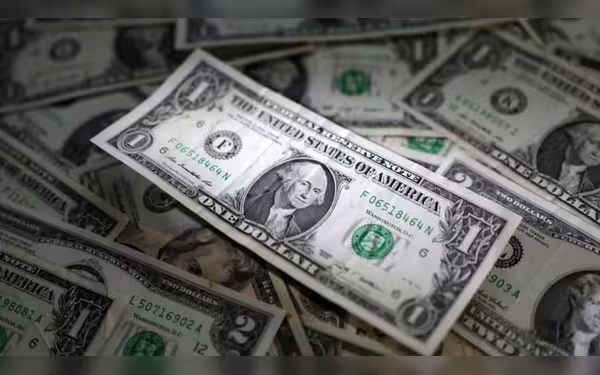Sunday, December 22, 2024 08:13 AM
Dollar Strengthens as Political Uncertainty Affects Euro
- U.S. dollar gains amid rising political uncertainties in Europe.
- French political instability raises risk premiums for investors.
- Upcoming payrolls report crucial for Federal Reserve's interest rate decisions.
 Image Credits: channelnewsasia
Image Credits: channelnewsasiaThe U.S. dollar rises amid political uncertainties in Europe, impacting the euro and influencing future interest rate decisions.
The global financial landscape is currently experiencing fluctuations, particularly with the U.S. dollar gaining strength amid rising political and economic uncertainties. Recently, the euro has faced downward pressure against the U.S. dollar, primarily due to concerns surrounding a potential government collapse in France. This situation has raised alarms about the country's ability to manage its budget deficit effectively.
As the political climate in France becomes increasingly unstable, investors are demanding a higher risk premium to hold French debt compared to German bonds. This shift was highlighted when Jordan Bardella, the president of France's far-right National Rally (RN), indicated that his party might support a no-confidence motion against the government unless there is a "last minute miracle." Marine Le Pen, a prominent RN lawmaker, has set a deadline for Prime Minister Michel Barnier to meet her party's budgetary demands.
Chris Turner, head of forex strategy at ING, noted that "French politics looks to be belatedly playing a role in forex and driving some euro underperformance." While many analysts believe that Le Pen may not want to trigger a government collapse due to the potential blame for a financial crisis, the pressure on the euro is expected to persist, especially with a no-confidence vote looming.
The yield spread between French and German 10-year government bonds has widened, indicating increased investor caution. This spread rose to 85 basis points, reflecting the highest level of risk since the euro area's sovereign debt crisis in 2012. Meanwhile, the U.S. dollar has seen a rise in value, particularly after President-elect Donald Trump shifted his stance to advocate for a stronger dollar, urging BRICS nations to refrain from creating alternative currencies.
The U.S. dollar index, which measures the dollar's value against other major currencies, increased by 0.6 percent to 106.39. Despite a slight decline last week, analysts believe that the dollar's strength is likely to continue, supported by the resilience of the U.S. economy. Jonas Goltermann, deputy chief markets economist at Capital Economics, stated, "Given the continued resilience of the U.S. economy and a worsening outlook elsewhere, we don't think this is the start of a deeper setback for the dollar." However, he also cautioned that the expectations for further interest rate shifts in favor of the U.S. are high.
Looking ahead, the upcoming November payrolls report is crucial, with forecasts suggesting an increase of 195,000 jobs. This report will play a significant role in shaping the Federal Reserve's decisions regarding interest rates. Currently, markets are pricing in a 65 percent chance of a rate cut by 25 basis points on December 18, with only two more cuts anticipated for 2025.
In the Asian markets, the Japanese yen has also seen fluctuations, with the dollar regaining some ground after a challenging week. Bank of Japan Governor Kazuo Ueda has indicated that interest rate hikes may be on the horizon, especially following positive economic data from Tokyo. This has led to speculation about the BOJ's potential actions in December.
The interplay between political developments in Europe and economic indicators in the U.S. is creating a complex environment for currency markets. Investors are advised to stay informed about these dynamics, as they will significantly influence exchange rates and investment strategies in the near future. Understanding these factors can help individuals and businesses navigate the uncertainties of the global economy more effectively.













